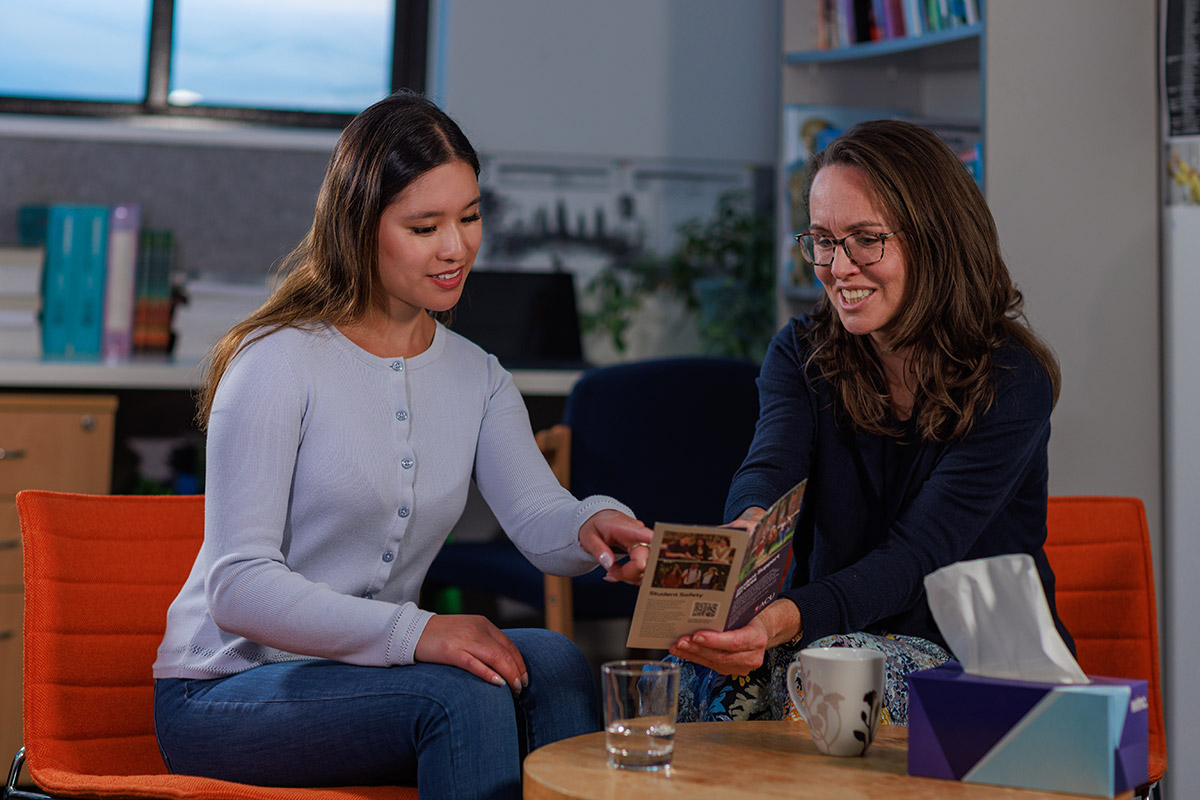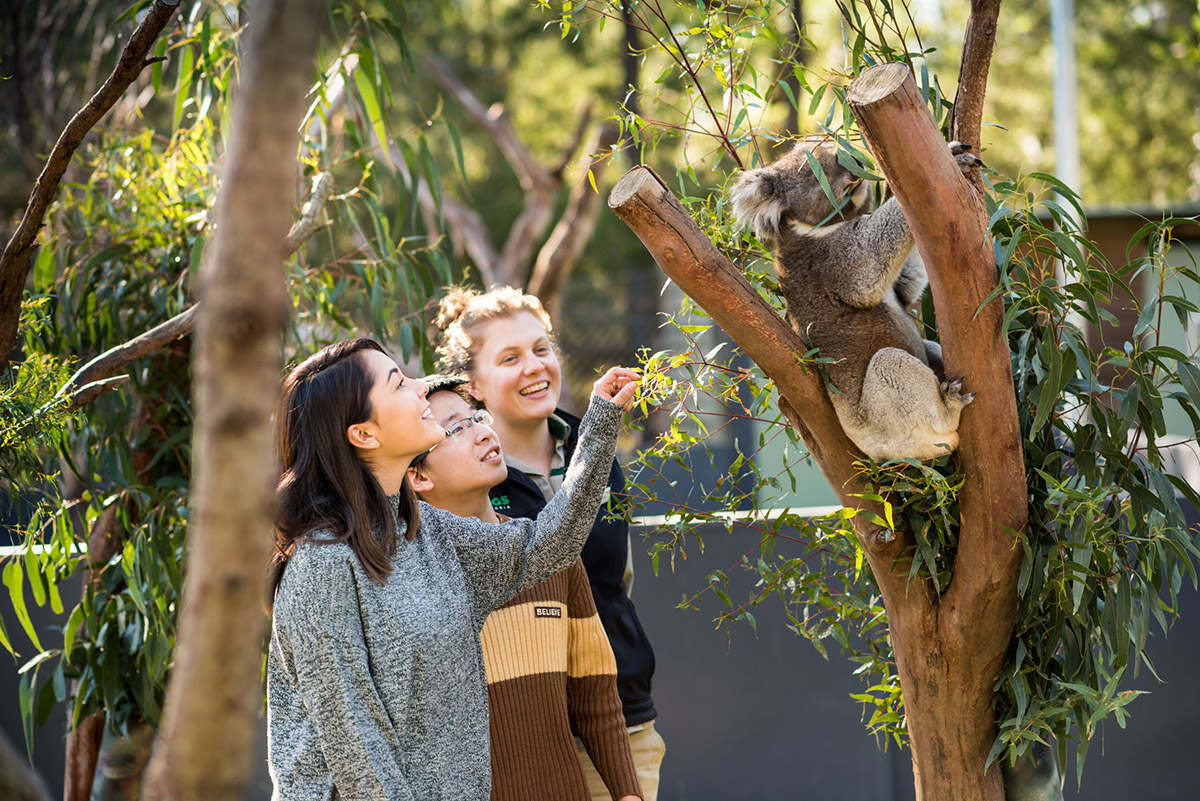When you're choosing a destination for your study abroad experience, finding somewhere with amazing educational opportunities should be at the top of your list.
Luckily, Victoria is home to world-class universities and educational institutions. Whatever you’re looking to study, you’re sure to find a great option here.
View transcript
Speaker, Amanda Abeysinghe, International Alumnus, Sri Lanka: The opportunities available to international students in Victoria are endless. [Amanda is speaking to camera, Melbourne's high rise city buildings in background]
Victoria is home to Australia's number one university, two of our universities rank in the world's top 50, and we have two universities with 40 or more subjects in the world's top 100. [Visuals of Melbourne parkland through to city skyline, students walking through campus, fashion design students working on models, scenes around campus and in lecture theatres]
Our higher education institutions also have outstanding sustainability achievements, as they actively tackle the world's greatest environmental, social
and governance challenges, shaping the next generation of socially responsible leaders. [Visuals of wind turbine, technology being explored in classes, green areas on campus and waterfront picnic]
Research performance and expertise in Victoria is considered at or above world standard.
With over 500,000 publications and research outputs, thousands of patents each year, and dedicated government funding to support cutting-edge innovation, Victoria is dedicated to backing research and ideas that can change the world - and you can be part of this! [Visuals of research students working on laptops, in libraries and robotics lab]
Studying at university, you can expect to join your peers in busy lecture theatres for formal presentations, engage in hands-on learning in workshops, benefit from smaller class sizes and one-on-one time with academics in tutorials, and then utilise common spaces, such as quiet libraries or bustling student hubs, for independent learning. [Scenes around university campuses, students enjoying life, in classes, working in libraries and other spaces]
Victoria's universities have over 50 campuses located across the state.
So you can find a course in a location that suits your budget and your lifestyle. [Visuals of students outdoors on campus and traveling to uni, walking along the Yarra]
Victoria's universities boast 96 disciplines with an ‘above standard rating’, and countless courses to suit you and your unique career goals. [Student searching course options on a computer, city views, green lab]
Victoria also offers a global education, where graduates are equipped to meet the challenges of a complex world, excel in their chosen field and establish a global network of peers. [Grad student working in high-vis vest, waterfront picnic, Melbourne streets]
This is where global careers are launched!
[Study Melbourne, Victoria, Australia logo]
Here is our ultimate guide to the 10 universities in Melbourne and regional Victoria.
Universities in Victoria - Ultimate Guide
Australian Catholic University (ACU)
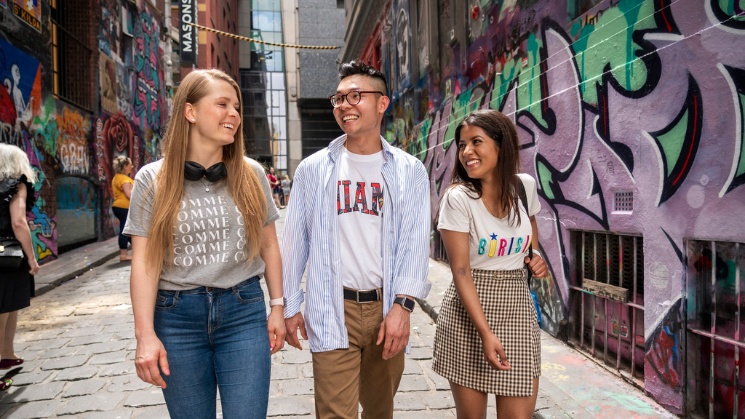
As one of the world’s top 100 young universities, ACU is known for its academic rigour, global connectivity and extensive professional networks. With a choice of four faculties, seven campuses in Australia and one in Rome, and more than 30,000 work-integrated learning opportunities on offer every year, ACU programs connect students with future career aspirations.
Institution Trading Name: Australian Catholic University
CRICOS Provider Code: 00004G
Locations: Melbourne and Ballarat.
Why international students choose Australian Catholic University:
- 1st in Australia for scientific impact across all disciplines (2024)
- Melbourne campus located in the heart of trendy Fitzroy
- Over 160 undergraduate and 60 postgraduate programs
- A welcoming, inclusive environment for students of all faiths and backgrounds
Courses
ACU is ranked first in Australia and 22 globally for its theology, divinity and religious studies by QS World University Rankings by Subject 2025. It is highly regarded for teaching in a range of specialist disciplines including:
- arts and humanities (ranked top 300 in the world - Times Higher Education World University Rankings by Subject 2025)
- classics and ancient history (ranked top 150 in the world - QS World University Rankings by Subject 2025)
- education and nursing (ranked top 50 in the world - Shanghai Ranking, Global Ranking of Academic Subjects 2024)
- psychology (ranked #5 in Australia and top 150 worldwide - Shanghai Ranking, Global Ranking of Academic Subjects 2024)
- sports science (ranked top 100 in the world - Shanghai Ranking, Global Ranking of Sport Science Schools and Departments 2024).
Global rankings
ACU was named in the top 100 young universities in the world by the Times Higher Education Young University Rankings 2024. 95 percent of ACU’s undergraduate and 95 percent of ACU’s postgraduate coursework graduates are employed, recognising ACU’s leadership in graduate employability.
Learn more about ACU’s global rankings performance.
Research
ACU develops innovative solutions to help solve real-world issues with world-leading research, and make a positive impact on industry, communities and individuals. The university ranked 1 in Australia and 24 worldwide for research quality, recognised in Times Higher Education World University Rankings 2025. It was recognised for its research strengths in psychology research (ranked first in the world for research quality) and education research (ranked 12 in the world for research quality) in the Times Higher Education World University Rankings by Subject 2025.
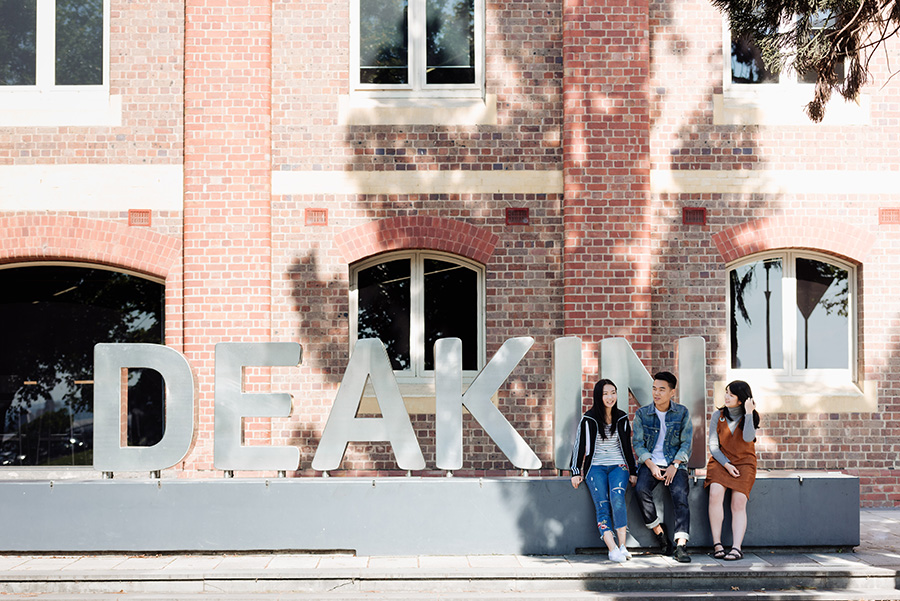
Deakin University offers high quality learning experiences across 4 faculties and 14 schools. Its students enjoy access to state-of-the-art facilities and outstanding support. Deakin University is ranked #1 in Victoria for graduate employment, course satisfaction and student satisfaction in the 2024 Graduate Outcomes Survey, Quality Indicators for Learning and Teaching (QILT).
Institution Trading Name: Deakin University (Deakin)
CRICOS Provider Code: 00113B
Locations: Melbourne, Warrnambool and Geelong.
Why international students choose Deakin:
- Consistently rated #1 in Victoria for student satisfaction (2023)
- Campuses in Melbourne, Geelong, and Warrnambool
- Industry-led, career-focused degrees
- Over 200 undergraduate and 150 postgraduate programs
- Supportive, inclusive community with strong student services
Courses
Deakin University offers reputable degrees in business and commerce, law, education, information technology, engineering, medicine and health, sport and design. Its courses are highly ranked globally by QS World University Rankings by Subject, and Times Higher Education World University Rankings by Subject, Shanghai Ranking, Global Ranking of Sport Science Schools and Departments, and U.S. News Best Global Universities Subject Rankings including:
- marine and freshwater biology (ranked #1 in Victoria - U.S. News Best Global Universities Subject Rankings)
- business administration (ranked #27 in the world - Shanghai Ranking, Global Ranking of Academic Subjects 2024)
- education (#3 in Australia for education and educational research and #13 globally - U.S. News Best Global Universities Subject Rankings)
- nursing (ranked #15 in the world - Shanghai Ranking, Global Ranking of Academic Subjects 2024)
- sport science (ranked #1 in the world - Shanghai Ranking, Global Ranking of Academic Subjects 2024).
Global rankings
In addition to being ranked #1 Victorian university for graduate employment in the 2026 QS World University Rankings, Deakin University is consistently placed among the top 200 universities in the world. It is recognised as #1 Victorian university for course satisfaction and #1 Victorian university for student support by the 2023 Australian Quality Indicators for Learning and Teaching survey.
Learn more about Deakin University’s global rankings performance.
Research
Deakin is recognised globally for its research quality, transforming bold ideas into solutions for global challenges, across a community of more than 2,000 researchers.
It is recognised as the #2 Victorian university for research quality (Times Higher Education World University Rankings 2025); #3 university in Victoria for research impact in the CTWS Leiden Ranking 2024; Australia’s #6 leading research institution by The Australian's 2025 Research Magazine; and #9 university in Australia for research impact in the CWTS Leiden Ranking, 2024.
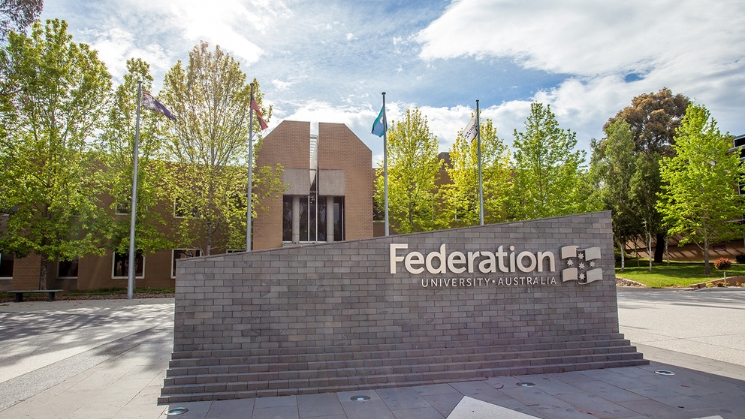
With multiple campuses across Victoria, Federation University is an ideal choice for those looking to study while experiencing the real community feel of regional Australia. Federation University is also known for its diverse and welcoming student community, sharing in the success of their 125,000 strong network of global alumni.
Institution Trading Name: Federation University Australia
CRICOS Provider Code: 00103D
Locations: Ballarat, Berwick, Gippsland and the Wimmera.
Courses
Federation University offers courses in an array of fields, from allied health and education to information technology. The institution is known for its co-operative approach to education, enabling students to earn while they learn through meaningful industry placements in their chosen field. One of Federation’s key features is its small class sizes, providing students with the best possible educational experience.
Global rankings
Federation University was classed in the top 200 young universities in the world according to the Times Higher Education Young University Rankings 2024. The university is recognised globally for its impact through the Times Higher Education Impact Rankings 2025, which places it in the top 10% of universities for overall sustainable development, and also recognises its global excellence in key impact areas:
- #24 for gender equality
- #27 for partnership for the goals
- #39 for reduced inequalities
- #45 for good health and wellbeing.
Learn more about Federation University’s global rankings performance.
Research
Federation University’s research excellence is reflected in the latest Excellence for Research Australia assessment, where Federation was rated at or above world standard in 80% of the submitted fields of research. It is among the top ten Australian universities for industry-connected graduate research programs.
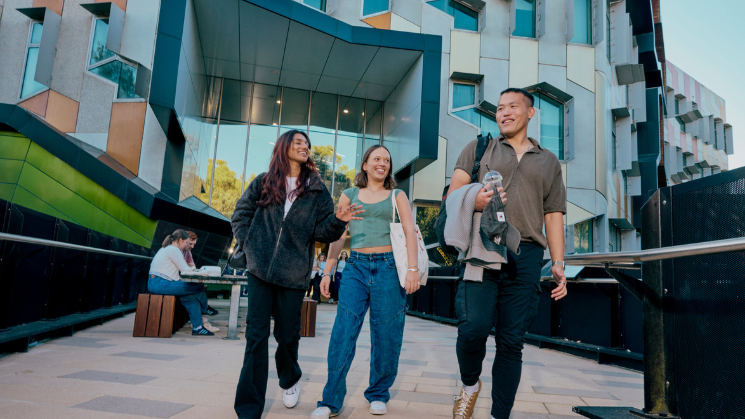
La Trobe is at the forefront of real impact in health, science and technology. La Trobe believes in preparing students for a lifelong career. That’s why work-integrated learning, work-based learning and industry placements are built into many courses, so students can gain practical skills and experience inside and outside of the classroom. With this focus on student satisfaction and career outcomes, La Trobe is ranked #1 in Victoria for undergraduate employability and postgraduate salaries according to Quality Indicators for Learning and Teaching (QILT) 2024 and 2023 Graduate Outcomes Survey - Longitudinal.
Institution Trading Name: La Trobe University
CRICOS Provider Code: 00115M
Locations: Albury-Wodonga, Bendigo, Bundoora, Epping, Melbourne, Mildura and Shepparton.
Why La Trobe appeals to international students:
- Strong reputation for research and teaching quality
- Practical, hands-on degrees across health, business, IT, science, and arts
- Rated #1 university in Victoria for employer satisfaction (QILT 2024)
- 7 campuses across Melbourne and regional Victoria
- Dedicated international student support
- Inclusive and welcoming community
Courses
According to the QS World University Rankings by Subject 2025, La Trobe’s Nursing is ranked equal 42nd globally, while sports‑related subjects remain in the top 50. Additionally, La Trobe continues to rank among the top 100 in the world for archaeology. La Trobe is highly regarded for teaching in a range of specialist disciplines including:
- business and commerce; and social sciences (ranked top 250 in the world - Times Higher Education World University Rankings by Subject 2025)
- education and teaching; health (ranked top 250 in the world - Times Higher Education World University Rankings by Subject 2025)
- IT and engineering (ranked top 300 in the world - Times Higher Education World University Rankings by Subject 2025
- science; law and criminology (ranked top 200 in the world - Times Higher Education World University Rankings by Subject 2025).
Global rankings
La Trobe has been ranked among the global top 250 universities in the QS World University Rankings 2026 and in the top 1% of worldwide universities in the Times Higher Education World University Rankings 2025.
Learn more about La Trobe University’s global rankings performance.
Research
La Trobe is top-rated nationally and rated ‘well above world standard’ in 23 fields of research, according to Australian Research Council, 2019, Excellence in Research for Australia (ERA) Outcomes 2018.
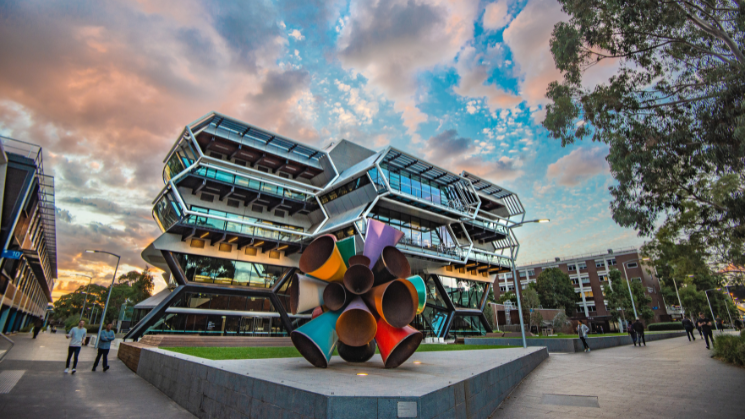
Monash University is a leading global research and education institution with a presence spanning the Indo-Pacific and into Europe. A founding member of the Group of Eight, the University’s broad academic expertise, diverse student cohort, and rich on-campus experiences combine to provide a wealth of opportunities to its more than 86,000 students.
Institution Trading Name: Monash University
CRICOS Provider Code: 00008C
Locations: Five campuses in Australia—Alfred, Clayton, Caulfield, Parkville, and Peninsula—along with campuses in Malaysia, Indonesia and Italy, and teaching locations in China and India.
Courses
Monash University is Australia’s largest university, offering a broad range of study options including comprehensive courses, specialist courses and double degrees that include a wide range of electives, graduate pathways and overseas study options. Rich educational experiences, such as the University’s flagship Global Immersion Guarantee (GIG) program, the Monash Innovation Guarantee (MIG), Research, Experimentation and Discovery (RED), and the Volunteering in Practice unit, enable students to stand out in a competitive global market. It is highly regarded for teaching in a range of specialist disciplines including:
- business administration (ranked #1 in Australia and #3 in the world - Shanghai Ranking, Global Ranking of Academic Subjects 2024)
- education (ranked #19 in the world and #2 in Australia - Times Higher Education World University Rankings by Subject 2025)
- computer science (ranked #61 in the world and #2 in Australia - Times Higher Education World University Rankings by Subject 2025)
- engineering (ranked #15 in the world for engineering – mineral and mining - QS World University Rankings by Subject 2025, and ranked #2 in Australia and =#59 globally for engineering - Times Higher Education World University Rankings by Subject 2025)
- medical and health (ranked #2 in Australia and #31 in the world - Times Higher Education World University Rankings by Subject 2025)
- pharmacy and pharmacology (ranked #1 in Australia and #4 in the world - QS World University Rankings by Subject 2025).
Global rankings
- =#36 (QS World University Rankings 2026)
- =#58 (Times Higher Education World University Rankings 2026)
- #76 (ShanghaiRanking Academic Ranking of World Universities 2025)
- #37 (QS Sustainability Rankings 2026)
- #63 (globally, #3 in Australia for the Times Higher Education World Reputation Rankings 2025)
- #38 (US News and World Report Best Global Universities Rankings 2025-26)
Learn more about Monash University’s global rankings performance.
Research
As a top 50 research-intensive university, Monash continues to accelerate major programmatic, multi-partner, mission-based endeavours to address the global challenges of the age – climate change, geopolitical security and thriving communities – for the betterment of local and international communities.
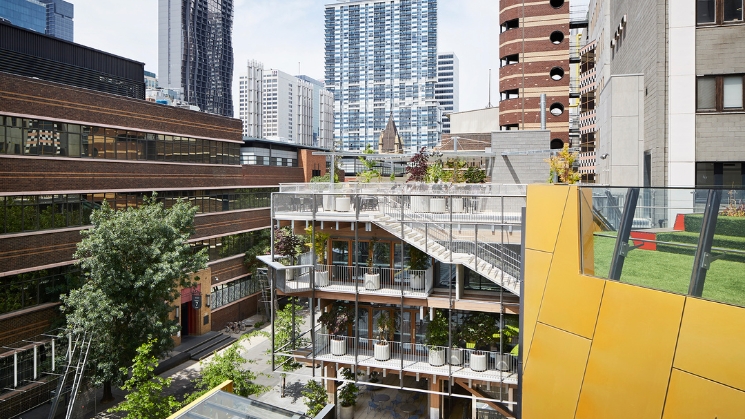
RMIT University is an international university of technology, design and enterprise. RMIT’s approach to teaching is grounded in hands-on learning and focuses on the development of real-world skills. With 24,245 students undertaking work-integrated learning activities with 4054 unique global industry partners in 2024, RMIT will get you ready for what’s next.
RMIT’s teaching takes place in state-of-the-art facilities with industry-connected courses. They give students the opportunity to put theory into practice with leading organisations, such as Adidas, Adobe, CSIRO, and the National Gallery of Victoria.
When you graduate from RMIT, you’ll join a global community of more than 500,000 alumni equipped with the skills and experience to make an impact in today’s industries, while being prepared for the opportunities of tomorrow.
Institution Trading Name: RMIT University (RMIT)
CRICOS Provider Code: 00122A
Locations: RMIT is an international university with three campuses in Melbourne (City, Brunswick and Bundoora), two in Vietnam (Hanoi and Saigon South), two aviation sites in Melbourne, and a research centre in Barcelona, Spain. RMIT graduates are well-positioned to take on careers that span the globe.
Courses
As the largest dual-sector university in Australia, RMIT has a diverse range of courses to suit to any student. RMIT offers everything from certificates to PhD study, and our pathways can help you achieve your study goals, even if you don’t meet the course requirements for your dream course. From art and design to business and engineering, RMIT has the right course for you.
It is highly regarded for teaching in a range of specialist disciplines in the QS World University Rankings by Subject 2025 including:
- art and design (ranked #1 in Australia)
- architecture and the built environment (ranked #1 in Australia)
- communications and media studies (ranked top 10 in Australia
- marketing (ranked top 10 in Australia)
- engineering - civil and structural (ranked top 10 in Australia).
Global rankings
- Ranked #5 in the Times Higher Education University Impact Rankings 2024 and #125 globally by QS World University Rankings 2026.
- Ranked #14 in Australia and #251–300 globally in the Times Higher Education World University Rankings 2026.
- #2 in Australia and #6 globally for Business Administration in the ShanghaiRanking Global Ranking of Academic Subjects 2025.
- Awarded a 5-Star QS ranking (2025) for excellence in teaching, employability, facilities, and inclusiveness.
Learn more about RMIT’s global rankings performance.
Research
RMIT has 50+ research collaborations and centres, such as the Centre for Innovative Justice, and the Centre for Cybersecurity and Innovation. RMIT research is internationally-recognised, with more than one-third of its publications among the top 25% most-cited in the world.
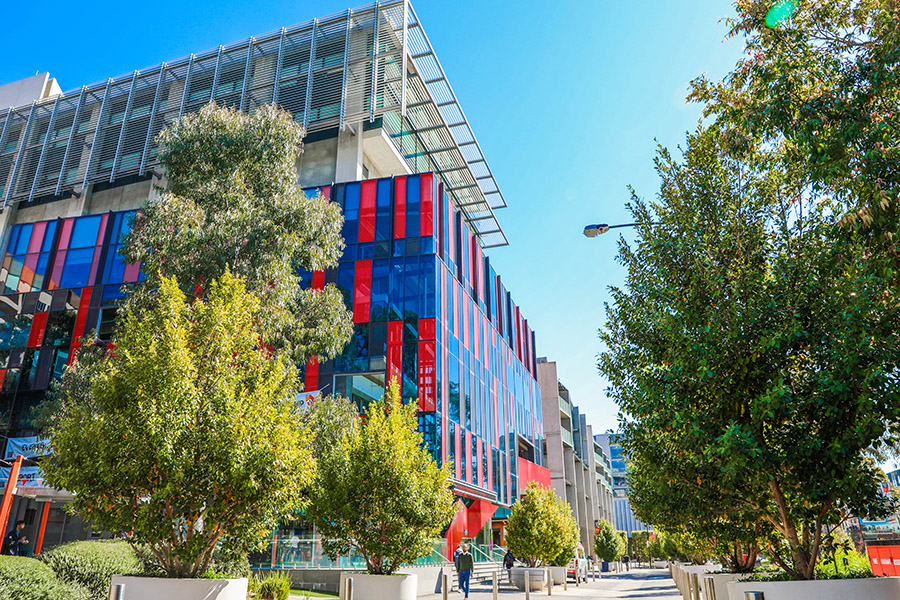
Swinburne University of Technology is a world-class university creating social and economic impact through science, technology and innovation. It offers real industry connections, industry-class facilities that connect people and technology for a better world.
Swinburne University has a global reputation for quality teaching, research and graduate outcomes, and a strong commitment to industry collaboration and innovation. As one of the world's top young (under 50 years old) universities, Swinburne has led the way with one of the first industry-based learning programs in Australia and remains committed to offering every Swinburne learner guaranteed industry experience.
Institution Trading Name: Swinburne University of Technology
CRICOS Provider Code: 00111D
Locations: Croydon, Hawthorn and Wantirna.
Courses
Swinburne offers qualifications that range from vocational education and training programs to higher education and PhD programs across six different schools. Its broad range of disciplines and close ties with industry provide students with opportunities for valuable work integrated learning experiences during their studies. Swinburne’s specialist disciplines include information technology, engineering, advanced manufacturing, business and design, with globally recognised courses including:
- architecture and built environment (ranked in the top 200 - QS World University Rankings by Subject 2025)
- art and design (ranked in the top 150 - QS World University Rankings by Subject 2025)
- automation and control (ranked in the top 15 - Shanghai Ranking, Global Ranking of Academic Subjects 2024)
- business and economics; engineering and technology (ranked in the top 200 - Times Higher Education World University Rankings by Subject 2025)
law, psychology and social sciences (ranked in the top 250 - Times Higher Education World University Rankings by Subject 2025).
Global rankings
Swinburne University’s standing in prestigious world academic ranking lists reflects its commitment to high-quality teaching, research and graduate outcomes. It is recognised as one of the world’s best young universities, ranking in the top 25 under 50 in the Times Higher Education Young University Rankings 2024.
Swinburne’s international reputation for quality research that connects science and technology with business and the community is reflecting in its recognition as one of the world’s top 1% of universities (QS World University Rankings 2024) and in the top 300 globally by the Times Higher Education World University Rankings 2025.
Learn more about Swinburne University’s global rankings performance.
Research
Swinburne focuses on delivering research that creates economic and social impact. It’s researchers produce innovative solutions to real-world problems across a range of disciplines and sectors.
Swinburne’s research degrees give students access to world-class researchers, first-rate facilities, training and support. The university is ranked among the top 300 research-intensive universities in the world, with outstanding researchers and facilities, specialist institutes and centres, strategic platforms and initiatives, and a focus on high-quality and ethically sound research.
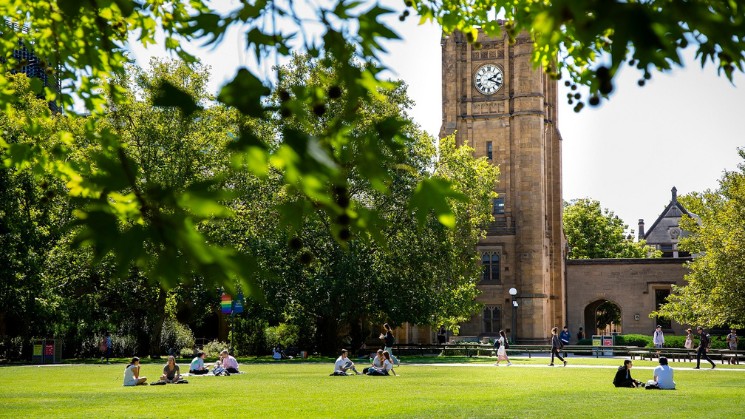
Founded in 1853, The University of Melbourne is Australia’s leading university with a strong tradition of higher education in the arts, sciences and numerous professional disciplines.
is currently ranked #1 in Australia and amongst the best in the world in the QS World University Rankings 2026, Times Higher Education World University Rankings 2025, and Shanghai Ranking, Academic Ranking of World Universities 2024.
Institution Trading Name: The University of Melbourne (UniMelb)
CRICOS Provider Code: 00116K
Locations: Parkville, Southbank, Burnley, Dookie, Creswick, Werribee, Shepparton.
Courses
The University of Melbourne has been named the top institution in Australia across a variety of course areas and amongst the best in the world according to the QS World University Rankings by Subject 2025, including:
- arts and humanities (ranked #1 in Australia and 23 in the world)
- biological sciences (ranked #1 in Australia and 34 in the world)
- data science and artificial intelligence (ranked #1 in Australia and 33 in the world)
- dentistry (ranked #1 in Australia and =34 in the world)
- education (ranked #1 in Australia and 16 in the world)
- law (ranked #1 in Australia and 13 in the world)
- life sciences and medicine (ranked #1 in Australia and 15 in the world)
- social sciences and management (ranked #1 in Australia and 27 in the world).
Global rankings
The University of Melbourne is the highest-ranked university in Australia and is currently ranked #1 in the QS World University Rankings 2026, Times Higher Education World University Rankings 2025, and Shanghai Ranking, Academic Ranking of World Universities 2024. It is also ranked #8 in the world for graduate employability worldwide (QS Graduate Employability 2022).
Learn more about The University of Melbourne’s global rankings performance.
Research
In Australia, our research expenditure is second only to that of the CSIRO. With more than 100 research centres and institutes, the University of Melbourne is a comprehensive research organisation that is addressing complex problems in innovative ways with investigator-led, interdisciplinary collaborations.
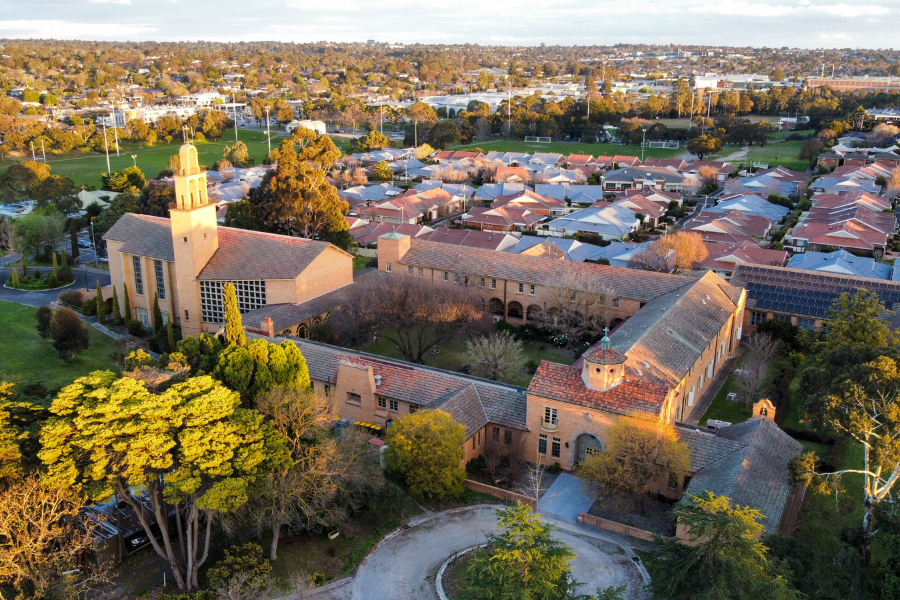
The University of Divinity offers world-class education in theology, philosophy, and spirituality, with a focus on small, supportive learning environments and interfaith understanding.
Institution Trading Name: University of Divinity
CRICOS Provider Code: 01037A
Locations: Melbourne
Courses
The University of Divinity delivers education and research in theology, philosophy and spirituality and for over one hundred years has prepared its graduates for ministry, leadership and community service.
Global rankings
The University is regularly ranked by students as the top University in Australia for student satisfaction and learner engagement, reflecting the high quality of its curriculum and the dedication of staff to working with small classes.
Research
The University of Divinity produces world-class research in all theological disciplines. It also offers a range of grants to higher degrees by research students, academic staff, honorary researchers and librarians.
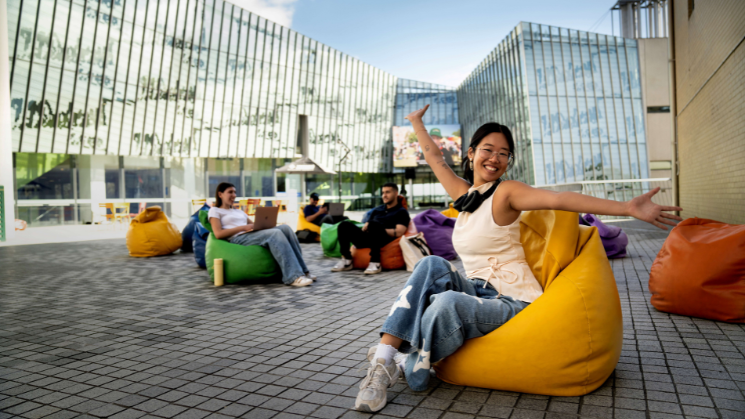
Victoria University is a world-class university celebrated for its inclusive environment, industry connections and innovative approach to education. With a history dating back over a century, VU is a dual-sector university offering internationally recognised qualifications ranging from vocational courses to postgraduate degrees. VU students benefit from state-of-the-art facilities, supportive staff and practical, real-world learning, with opportunities for work placements and industry projects. The unique VU Block Model® allows students to achieve their best by focusing on one or two subjects at a time in small, interactive classes. It’s an award-winning teaching method that has significantly improved student engagement and results.
Institution Trading Name: Victoria University
CRICOS Provider Code: 00124K
Locations: Footscray, Melbourne, St Albans and Sunshine.
Courses
VU offers a wide range of internationally recognised, industry-focused qualifications from vocational education to research in subject areas spanning arts, business, education, engineering, health, biomedicine, IT, nursing, hospitality, law, social work and sports science.
VU courses are recognised for excellence in career readiness, practical learning, inclusion, opportunity and excellence, including:
- sports science (ranked #7 for Sport Science Schools – for the third year running in the Shanghai Ranking, Global Ranking of Academic Subjects 2024 and #43 for Sports Related Subjects - QS World University Rankings by Subject 2025)
- educational experience, peer engagement, skills development and teaching quality (ranked #1 university in Victoria - QILT Student Experience Survey 2023)
- technical skills and foundation skills (ranked #1 in Australia - QILT Employer Satisfaction Survey 2022)
- employer satisfaction (ranked in the Australia’s top 10 for overall employer - QILT Employer Satisfaction Survey 2022).
Global rankings
Victoria University is ranked in the top 2% of all universities worldwide, according to the Times Higher Education World University Rankings 2025. VU also ranks among the top 70 young universities in the world (universities under the age of 50) in the Times Higher Education Young University Rankings.
Learn more about Victoria University’s global rankings performance .
Research
In the latest Excellence in Research for Australia (ERA) National Report, Victoria University received five-star ratings for its research outputs in 6 areas including engineering, nursing, medical physiology, human movement and sport science, and electrical and electronic engineering. On its campuses, you’ll find numerous research institutes, including the Institute for Health and Sport, the Institute for Sustainable Industries and Liveable Cities, and the Western Centre for Health Research and Education.
Find a course
Search and compare all the study options available in Victoria:
Page last updated:



